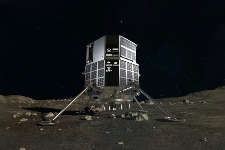First Moon Landing Attempted by a Private Business Fails

The first ever lunar landing by a privately owned space organization was a failed mission.
May 17, 2023
The first ever private moon landing almost occurred at 12:40 p.m. (EST) on Tuesday, April 25, 2023. It would have been a monumental moment in history since no other private spacecraft has ever landed on the moon. Lunar landings have only been successfully conducted by the United States, China, and Russia.
The private company called ispace is run in Tokyo. According to ispace’s website, its goal is to connect the Moon and Earth into entities that can both be useful for mankind. They want to take advantage of lunar water sources to “enrich our daily lives on earth.” Their first step is to find water sources on the moon in order to increase sustainability. The April landing would have been ispace’s first step towards this goal.
Moments before its landing, the spacecraft lost connection with flight controllers on earth. Contact was lost when the rocket was 33 feet from the landing site while traveling 16 miles per hour. Based on this, it is likely that the lander crashed on the moon after disconnecting.
According to the ispace website, this was planned to be their first of three missions. Mission one is labeled as M1, mission two as M2, etc. This attempt was M1, a moon landing. Following this landing, the second mission would have been to place a rover on the moon for surface exploration. In the third mission and beyond, the company was planning on having more frequent landings and rovers on the moon, while providing for customers by transporting payloads. They hope to discover more lunar resources and establish a human presence on the moon.
The CEO and founder of the company, Takeshi Hakamada, claims that the company has “to assume that we could not complete the landing on the lunar surface.” This mission of landing on the moon was planned with a series of nine “successes.” The company claims that this would be Success nine of Mission one, and though it was unachieved, they plan on using Successes one through eight’s data and new information collected by the failed lunar landing to create a better rocket and landing.
Though the landing failed, ispace became the first privately owned space company to attempt to land on the moon. Because of this, it has made way for many advancements in technology and shown that anything can be possible. Scarlett Jones (10), believes that “this is paving the way for private businesses to contribute more to space discovery.”





































